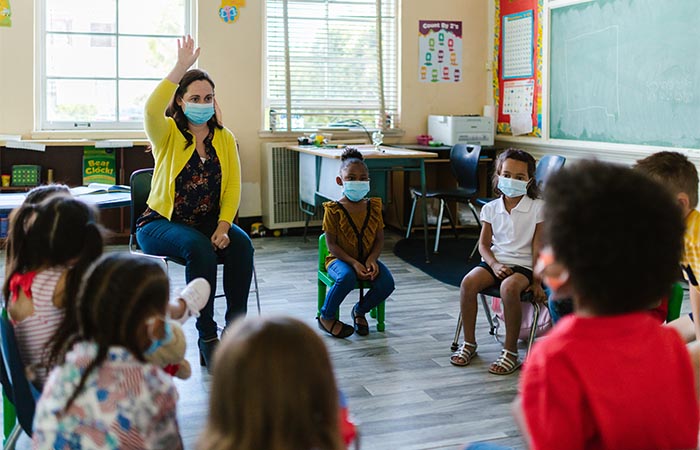Problem-solving is integral to a child’s cognitive development and lays the foundation for their future learning. It encourages resilience and creativity while promoting analytical, critical, and decision-making abilities.
Preschoolers who participate in problem-solving activities gain essential life skills that help them throughout their lives and improve their cognitive capacities. Also, these skills encourage preschoolers to showcase their thinking, discuss different approaches, and learn from mistakes. This mindset fosters personal growth.
However, this guide is for parents or caregivers who aim to provide an overview of problem-solving for preschoolers to foster this crucial practical skill or activity.
6 Problem-Solving Skills for Preschoolers
Problem-solving abilities are a crucial part of preschoolers’ general cognitive and social-emotional development. To accomplish the skills effectively in problem-solving, you need to be skilled, which is typically acquired or learned. There are some of the techniques or skills, which are as follows:
1. Observation
You can encourage preschoolers to observe and gather information about the issue or problems they are having difficulty solving. Afterward, they can detect notable facts, comprehend the context, and make a judgment based on this skill.
2. Critical thinking
Critical thinking is another skill that should be taught to preschoolers. You may encourage them to examine situations, pose questions, and take into account other viewpoints. As a result, preschoolers can gain a greater grasp of problem-solving skills.
3. Decision making
Make sure to provide knowledge of the pros and cons of many alternatives and select the best course of action for preschoolers. Also, you can encourage them to think through the implications of their choices and potential outcomes. This is how they may build decision-making abilities.
4. Logical reasoning
Try to engage or guide the preschoolers in tasks that call for sequencing, pattern identification, and cause-and-effect thinking to support the development of logical reasoning abilities. With this, they can comprehend relationships and draw logical conclusions.
5. Encourage independent thinking
Encourage them to ask questions and then figure out the answers on their own to promote independent thinking. Moreover, exercise critical thought, make choices, and develop original answers; this is how you can develop independence and confidence in preschoolers.
6. Encourage trial and error
By identifying and eliminating mistakes through a variety of experimental procedures, trial, and error is the process of establishing the best way to achieve the intended result.
6 Problem-solving activities for preschoolers
There are many engaging problem-solving activities for preschoolers. Some of them are as follows:
1. Provide open-ended play materials
Cognitive development benefits from open-ended resources. It helps you to explore, create, and develop critical thinking in preschoolers since there are countless ways that open-ended materials can be handled and toyed with.
Some examples of open-ended play materials are sand, water, bricks, paint, and play dough. They may explore, experiment, and develop original answers to a variety of problems using these items.
2. Ask open-ended questions
By asking open-ended questions to preschoolers, you can challenge them to think critically and articulate their opinions. Pose queries like, ‘’What do you think will happen if we mix these colors?” This is one of the examples that will give them a moment to think critically.
3. Offer puzzles and problem-solving games
You may improve preschoolers’ logical thinking and problem-solving abilities by offering puzzles and age-appropriate problem-solving activities. As their skills develop, you may use these games to help them hone physical abilities, including motor skills, spatial awareness, and hand-eye coordination. Additionally, it can support their mental abilities, including critical thinking and creative problem-solving.
4. Foster collaborative problem-solving
A collaborative problem-solving strategy involves collaborating in small groups to accomplish a common objective, such as resolving a dilemma or finishing a project. This may help you develop creativity and communication abilities in preschoolers.
5. Provide real-life problem-solving opportunities
Include real-world issues in problem-solving exercises for your preschoolers. Furthermore, you can include them in the design and setup of a snack table, and the sorting of items by size or color. This enables individuals to use their problem-solving abilities in real-world settings.
6. Use visual ads
To make learning more engaging, entertaining, and successful, a teacher uses visual ads to establish, clarify, connect, and correlate ideas and concepts. Using flowcharts, AS diagrams, and sticky notes as visual tools in your problem-solving process is known as visual problem-solving.
Teachers or parents, by using this useful technique, can provide more clarity by demonstrating how various aspects relate to one another. By using visual tools, you can assist preschoolers in comprehending issues and coming up with solutions, such as diagrams or charts.
Verdict
Preschool problem-solving exercises are a great way to foster early creativity, critical thinking, and decision-making abilities. It’s essential to provide a supportive and nurturing environment that will allow them to practice and develop these skills.
To conclude, by incorporating problem-solving opportunities into their daily activities, you can help them build a strong foundation for future learning and problem-solving capabilities.

